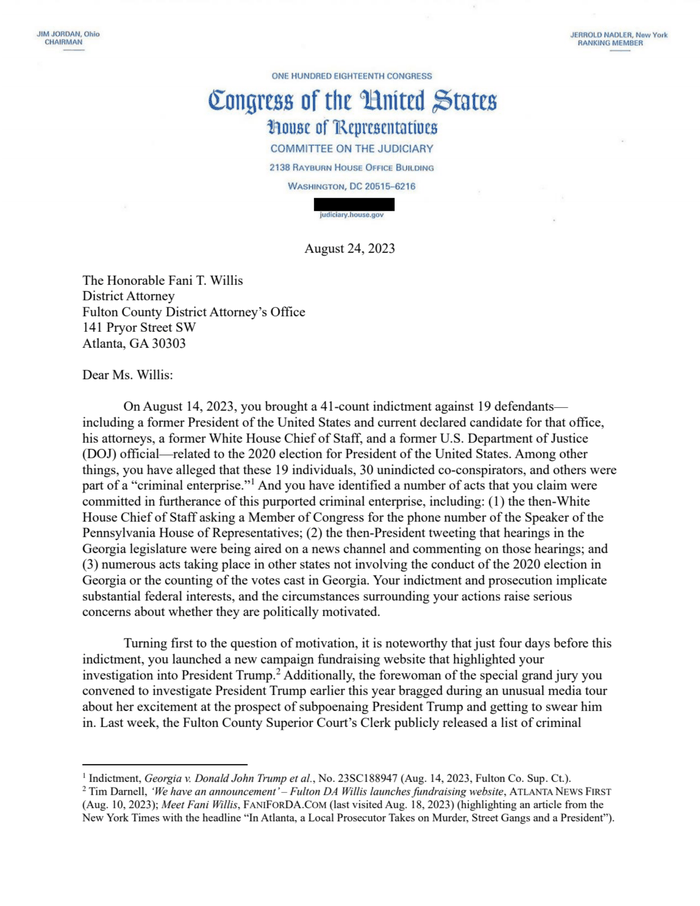Imagine a political landscape where accusations of election interference and obstruction of justice hang heavy in the air. This is precisely the atmosphere that enveloped the 2020 presidential election and its aftermath, and it is here, amidst this charged environment, that Fani Willis, the District Attorney of Fulton County, Georgia, sent a letter that would become a focal point of national attention. This letter, addressed to Jim Jordan, a Republican congressman from Ohio and a staunch ally of former President Donald Trump, is the subject of our exploration today. More than just a legal correspondence, it offers a glimpse into a political drama unfolding in Georgia, a state that played a pivotal role in the 2020 election.

Image: www.documentcloud.org
The letter, dated June 23, 2022, arrived at a time when investigations related to the 2020 election were gaining momentum. Willis, a seasoned prosecutor known for her dedication to justice, had initiated a probe into potential criminal interference in the election results. The focus of her investigation centered on Trump’s attempts to overturn the election outcome in Georgia, including his infamous phone call to Georgia Secretary of State Brad Raffensperger, urging him to “find” enough votes to secure a victory. Jordan’s involvement in this saga became significant when it was revealed that he had been in communication with Trump and his allies during those critical weeks following the election.
Delving into the Letter’s Content
The letter from Willis to Jordan was not merely a routine request for information. It served as a formal summons, demanding Jordan’s presence as a witness in the ongoing investigation. This was no ordinary legal situation. The letter set the stage for a high-profile showdown between a determined prosecutor and a powerful politician, a clash that would captivate the nation’s attention.
Within the letter, Willis meticulously laid out her case, outlining the specific areas of inquiry she hoped to address during Jordan’s testimony. She expressed concern about his role in the efforts to overturn the election results, particularly highlighting his communications with Trump and his team. She also expressed interest in understanding Jordan’s potential role in the events leading up to the January 6th Capitol riot, another event that has been closely linked to the 2020 election.
The Political Backdrop and Jordan’s Response
The timing and content of Willis’s letter could not have been more politically explosive. It arrived as the House Select Committee investigating the January 6th attack was holding public hearings, revealing damning evidence of Trump’s attempts to overturn the election. It was also a time when Trump was facing various legal challenges, including the ongoing investigation into his handling of classified documents and potential obstruction of justice charges.
Jordan, a vocal supporter of Trump, naturally rejected Willis’s request. He refused to cooperate with the investigation, citing his constitutional right against self-incrimination. His refusal was met with strong condemnation from Democrats, who accused him of obstructing justice and prioritizing his political loyalty over his duty as a witness.
Public Scrutiny and the Implications of Jordan’s Refusal
The letter’s existence became a major news story, igniting heated debate across the political spectrum. The public was keenly interested in the details of the investigation and Jordan’s potential involvement. Did he play a role in the alleged attempts to overturn the election results? What information did he possess about Trump’s actions? This letter, and Jordan’s refusal to cooperate, effectively thrust the congressman into the center of a political storm.
The implications of Jordan’s refusal to testify were far-reaching. It cast a shadow of suspicion over his actions and suggested a willingness to shield Trump from scrutiny. It also raised serious questions about the sanctity of the justice system and the willingness of those in power to collaborate with investigations seeking to uncover truth.

Image: www.dailykos.com
The Impact on the Georgia Investigation and the Future of the Case
The letter’s release and Jordan’s refusal to participate in the investigation fueled public scrutiny and intensified the political pressure surrounding the case. It also highlighted the challenge that Willis and her team faced in navigating the complexities of this highly politicized investigation.
Despite the obstacles, the investigation continued. Willis pursued other avenues to gather evidence, including issuing subpoenas to other individuals associated with the events. She also sought to secure testimony from key witnesses who were willing to cooperate. The case remained a focal point of media attention, prompting relentless speculation about the potential outcomes and consequences.
Beyond the Legal Battles: A Deeper Look at the Political Implications
Beyond the legal battles unfolding in Georgia, the Fani Willis letter to Jim Jordan encapsulated a deeper struggle at the heart of American democracy. It exposed a divide between those seeking accountability and truth and those seeking to protect their political allies even at the expense of transparency.
This letter, and the events surrounding it, served as a stark reminder of the fragility of democratic institutions and the importance of holding those in positions of power accountable for their actions. It also highlighted the complexities of navigating political and legal systems that often operate with conflicting interests and agendas.
Copy Of Fani Willis Letter To Jim Jordan
Conclusion: A Moment of Truth
The Fani Willis letter to Jim Jordan may be a legal document, but it carries immense political weight and resonates with the anxieties of a democracy seeking accountability. It represents a pivotal moment in the ongoing saga of the 2020 election, highlighting the political and legal battles that continue to shape the nation’s landscape.
The investigation in Georgia, the refusal to cooperate, and the ongoing national dialogue surrounding these events are all testaments to the ongoing struggle for truth and justice. They remind us that democracy is not a spectator sport and that upholding its principles requires active participation and a willingness to challenge those who seek to undermine its foundations.






